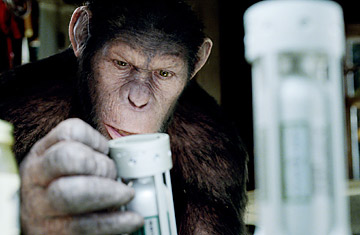
Academy Award–winning visual-effects house Weta Digital created Caesar, a computer-generated character of unprecedented emotion and intelligence, for Rise of the Planet of the Apes
(2 of 2)
Like any precocious child, Caesar will learn from, outgrow and defy his doting, fearful "father." But his first act of violence is in defense of his "grandfather." When the addled Charles accidentally wrecks a neighbor's car and Caesar sees the man threatening Charles, the chimp vaults from the house in attack mode. That gets him sentenced to an animal shelter that is in fact an ape Alcatraz, stocked with ill-treated simian prisoners, an uncaring warden (Brian Cox) and a sadistic guard (Tom Felton, trumping the meanness of his Draco Malfoy character from the Harry Potter films). In this second act, Wyatt, whose previous feature was the prison-break movie The Escapist (also starring Cox), switches Rise's gears from Born Free to The Shawshank Redemption.
If the animal-shelter personnel had been as humane as Kevin James in Zookeeper, the apes might never have revolted. When Caesar first joins them, they are a surly, unmotivated lot, eager to demonstrate that his superior intellect and domesticated temperament are no match for their mighty brawn. But Caesar briefly escapes, returns to Will's place to filch a supply of the wonder drug and gives it to the incarcerated chimps, plus an orangutan and a gorilla. As he liberates the apes and triggers the irresistible rise promised in the title, the movie becomes a political fable: a Marxist view of the oppressed masses edging toward revolution. While underlining Will's kind nature and good intentions, Rise has tilted audience sympathies toward the apes from the first scene, in which armed natives capture the chimps from their jungle home. The best drama comes from a collision of two good men; this time the conflict is between one good, brilliant man and one good, smarter chimp.
Will is of course Baron Frankenstein, with an urge to improve life through science and the ambition to achieve it by questionable means. The questions are posed mainly by his girlfriend (Slumdog Millionaire's Freida Pinto), who is there mostly as the obligatory voice of Christian caution ("You're trying to control things not meant to be controlled" and "Some things aren't meant to be changed"). He may feel like a father to Caesar, but he is also the colonial oppressor. It takes a while for Caesar to realize that his best self is not a near-human but the best chimp, and that his destiny is to lead his people to freedom like a monkey Moses, a simian Spartacus.
Rise occasionally cites memorable moments from the first Planet of the Apes: in Bright Eyes, the name given to Caesar's mother (which was also what the evolved apes called Charlton Heston's character in the 1968 film); in the harsh hosing of the imprisoned apes; and in the famous lines "It's a madhouse!" and "Take your stinkin' paw off me, you damned dirty ape!" — which cues one of the most startling retorts in recent movie history. (I won't tell; you have to see it.) But the creators of Rise are determined to make their own statement. The original film was a satire of race relations, in the decade of the Selma marches and Watts riots, with the haughty apes treating their human invaders as inferiors. Rise is a story of emancipation as seen from both sides: the human (sympathetic liberals incapable of stanching an armed revolt) and the simian (we gotta be free).
Even if you don't buy Rise as a semiprofound social document, the utterly seductive integration of apes and men should slacken your jaw in amazement. We have reached that moment in movie history when the century-long chasm between live action and animation has been closed; Rise is a seamless blend of the two. It marks a major advance over Avatar, for it allows the motion-capture actors and the "real" ones to interact in natural locations — in the wild, so to speak — beyond Avatar's enclosed fantasyland of the planet Pandora. Technical innovation is sometimes yoked to leaden narratives, but Wyatt and his collaborators made sure to wed their visual strategies to potent themes. The result is a work of high, often thrilling popular art.
